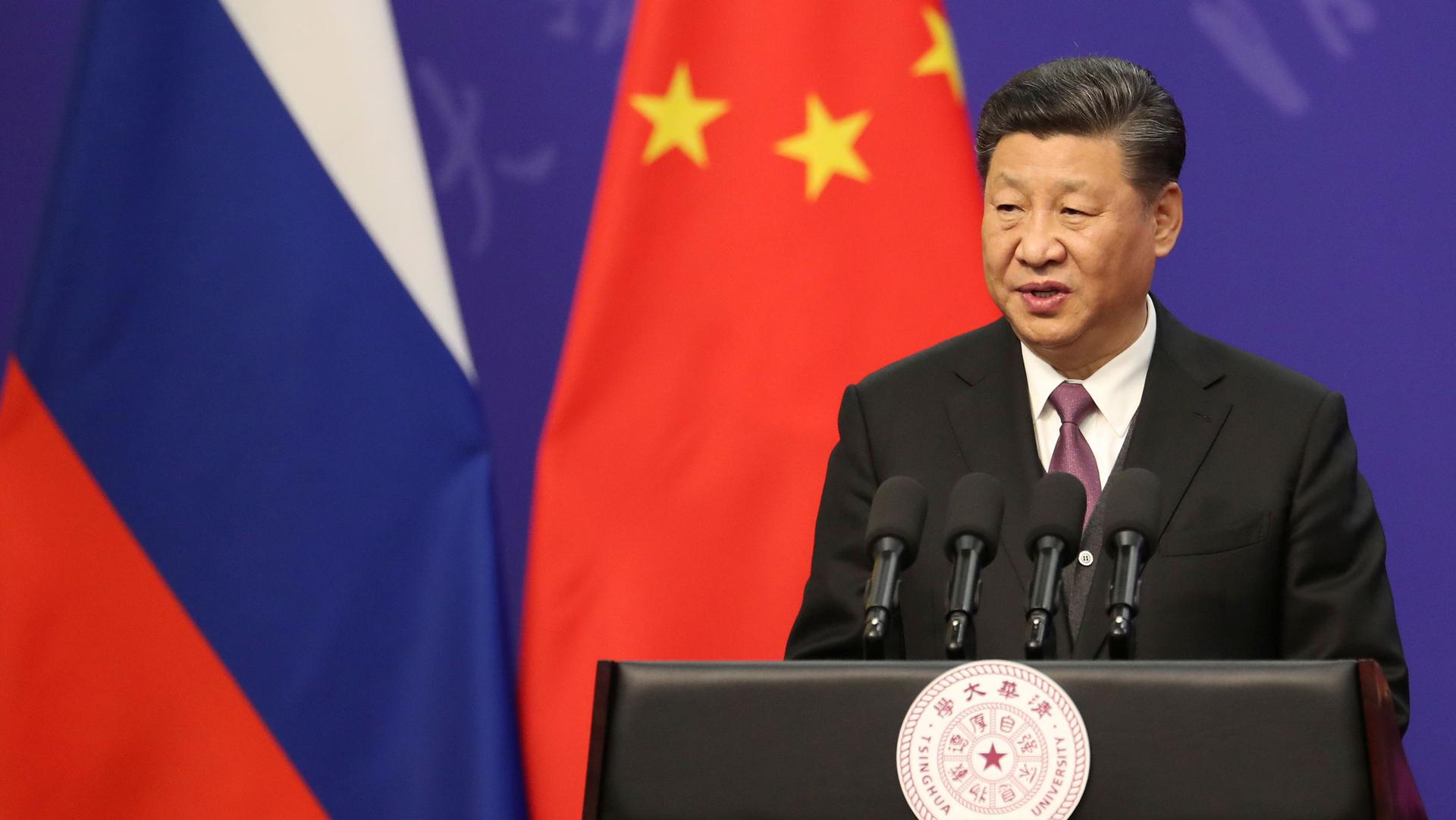China’s Xi says Belt and Road must be green, sustainable
Chinese President Xi Jinping gives a speech at Friendship Palace in Beijing, China, April 26, 2019.
In a speech opening a summit on China’s Belt and Road Initiative (BRI), President Xi Jinping said the massive infrastructure project must be green and sustainable.
Xi’s plan to rebuild the old Silk Road to connect China with Asia, Europe and beyond has become mired in controversy as some partner nations have bemoaned the high cost of infrastructure projects.
China has not said exactly how much the ambitious plan will cost, but some independent estimates suggest it will run into several trillion dollars.
Beijing has repeatedly said it is not seeking to trap countries that sign up to BRI with debt, and will use this week’s summit in Beijing to address those concerns and recalibrate the policy.
Listen: China’s ‘One Belt, One Road’ showcase
Xi said in a keynote speech on Friday that environmental protection must underpin the initiative “to protect the common home we live in.”
“Operate in the sun and fight corruption together with zero tolerance,” Xi said.
“Building high-quality, sustainable, risk-resistant, reasonably priced, and inclusive infrastructure will help countries to fully utilize their resource endowments,” he added.
Unlike the first summit in 2017, where Xi said Chinese banks will lend 380 billion yuan ($56.4 billion) to support BRI cooperation, he did not give a figure for new financing support.
However, Xi will give another speech on Saturday.
Western governments have tended to view the plan as a means to spread Chinese influence abroad, saddling poor countries with unsustainable debt.
While most of the BRI projects are continuing as planned, some have been caught up by changes in government in countries such as Malaysia and the Maldives.
Those that have been shelved for financial reasons include a power plant in Pakistan and an airport in Sierra Leone, and Beijing has rebuffed critics by saying that not one country has been burdened with so-called “debt traps.”
Since 2017, the finance ministries of 28 countries have called on governments, financial institutions and companies from BRI countries to work together to build a long-term, stable and sustainable financing system to manage risks, China’s finance ministry said in a report released on Thursday.
Debt sustainability has to be taken into account when mobilizing funds, the ministry said in the report, which outlined a framework for use in analyzing debt sustainability of low-income BRI nations and managing debt risks.
Xi launched BRI in 2013, and according to data from Refinitiv, the total value of projects in the scheme stands at $3.67 trillion, spanning countries in Asia, Europe, Africa, Oceania and South America.
“The BRI is an extraordinarily ambitious vision. To turn that vision into a sustainable reality, it must work for everyone involved.”
“The BRI is an extraordinarily ambitious vision. To turn that vision into a sustainable reality, it must work for everyone involved,” British finance minister Philip Hammond said at the summit.
The potential benefits are clear, but to deliver them, BRI must operate according to the highest global standards with all parties working together within the rules-based international system to create genuine win-win outcomes for all, he said.
Chinese promises
The BRI will also create development opportunities for China just as the country itself is further opening its markets to the world, Xi said.
He said China will “improve laws and regulations, regulate government behavior at all levels in administrative licensing, market supervision and other areas, and clean up and abolish unreasonable regulations, subsidies and practices that impede fair competition and distort the market.”
Xi promised to significantly shorten the negative list for foreign investments, and allow foreign companies to take a majority stake or set up wholly-owned companies in more sectors.
Tariffs will be lower and non-tariff barriers will be eliminated, he added.
China also aims to import more services and goods, and is willing to import competitive agricultural products and services to achieve trade balance.
Visiting leaders
Summit attendees include Russian President Vladimir Putin and Prime Minister Imran Khan of Pakistan, a close China ally and among the biggest recipients of BRI investment, as well as Prime Minister Giuseppe Conte of Italy, which recently became the first G7 country to sign on.
Khan told the summit that in a world of uncertainty, the initiative offered “a model of collaboration, partnership, connectivity and shared prosperity.”
Cambodian Prime Minister Hun Sen took aim at critics who have described Belt and Road as a debt trap, pointing to the successful example of a Chinese-funded highway between Phnom Penh and the port city of Sihanoukville.
“Cambodia has not only been able to plan this project for the benefit of the people but also achieve financial engineering that does not increase public debt to the state,” he said, in comments translated into English.
European countries have signaled their willingness to participate in the BRI, but key states like France and Germany have said China must in turn improve access and fair competition for foreign firms.
Major European Union countries want to sign a memorandum of understanding on the BRI as a group and not as individual states, German Economy Minister Peter Altmaier said.
The United States, which has not joined the Belt and Road, is expected to send only lower-level officials, and nobody from Washington.
“We continue to have serious concerns that China’s infrastructure diplomacy activities ignore or weaken international standards and best practices related to development, labor protections, and environmental protection,” a spokesman for the US Embassy in Beijing said.
By Brenda Goh and Cate Cadell/Reuters
Reporting by Brenda Goh and Cate Cadell; Additional reporting by Tony Munroe, Stella Qiu, Ryan Woo, Yilei Sun, and Tom Daly; Writing by Ben Blanchard; Editing by Simon Cameron-Moore and Darren Schuettler.
